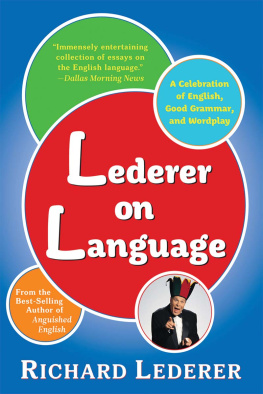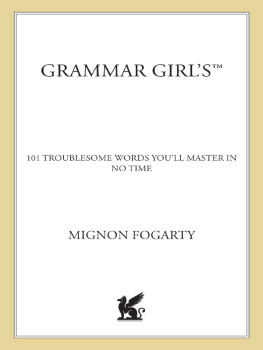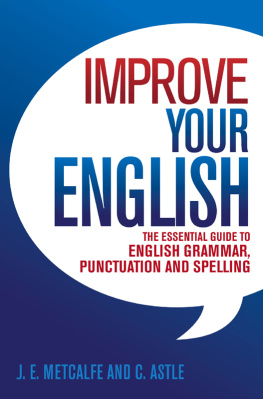
Also by Richard Lederer
Adventures of a Verbivore
Amazing Words
American Trivia (with Caroline McCullagh)
Anguished English
Animal Crackers Junior (with Jim Ertner)
The Ants Are My Friends (with Stan Kegel)
Basic Verbal Skills (with Philip Burnham)
The Big Book of Word Play Crosswords (with Gayle Dean)
The Bride of Anguished English
Building Bridge (with Bo Schambelan and Arnold Fisher)
The Circus of Words
Classic Literary Trivia
Cleverly Comical Animal Jokes (with Jim Ertner)
Comma Sense (with John Shore)
Crazy English
The Cunning Linguist
Fractured English
Get Thee to a Punnery
The Giant Book of Animal Jokes (with Jim Ertner)
The Gift of Age
Have Yourself a Punny Little Christmas
Hilarious Holiday Humor (with Stan Kegel)
Literary Trivia
A Man of My Words
The Miracle of Language
More Anguished English
The Play of Words
Presidential Trivia
Pun & Games
Puns Spooken Here
The Revenge of Anguished English
Rip Roaring Animal Jokes (with Jim Ertner)
Sleeping Dogs Dont Lay (with Richard Dowis)
Super Funny Animal Jokes (with Jim Ertner)
A Treasury for Cat Lovers
A Treasury for Dog Lovers
Wild & Wacky Animal Jokes (with Jim Ertner)
The Word Circus
Word Wizard
The Write Way (with Richard Dowis)

To Frederic Cassidy, Joan Houston Hall, and their many colleagues, on completing, after fifty years, the Dictionary of American Regional English
Acknowledgments
Thanks to Charles Harrington Elster for his hand in shaping A Declaration of Language Independence and to Barbara Berti for permission to use excerpts from my appearance on The Jim Bohannon Show.
Versions of Stamp Out Fadspeak and How Wise is Proverbial Wisdom first appeared in Verbatim and A Declaration of Language Independence in my foreword to Dictionary of Americanisms (John Wiley & Sons, 2003).
Portions of this book first appeared in A Man of My Words (St. Martins, 2003).
Published by Marion Street Press
4207 SE Woodstock Blvd # 168
Portland, OR 97206-6267
USA
http://www.marionstreetpress.com/
Orders and review copies: (800) 888-4741
Copyright 2013 by Richard Lederer
All rights reserved.
Printed in the United States of America
ISBN 978-1-936863-13-6
Front cover photo by Hoffman Photographic
Back cover photo by Kim Treffinger
Library of Congress Cataloging-in-Publication Data pending
Contents
Introduction: Confessions of a Verbivore
O ne day I found myself chatting with Marilyn Fraziers class of sixth-grade students at Broken Ground School in Concord, New Hampshire, about the joys of language and the challenges of the writing life. During the question-and-answer session that followed, one of the boys in the class asked me, Dr. Lederer, where do you get your ideas for your books?
Ever since I became a writer, I had found that question to be the most difficult to answer and had only recently come up with an analogy that I thought would satisfy both my audience and me. Pouncing on the opportunity to unveil my spanking new explanation for the first time, I countered with Where does the spider get its web?
The idea, of course, was that the spider is not aware of how it spins out intricate and beautiful patterns with the silky material that is simply a natural part of itself. Asking a writer to account for the genesis of his or her ideas is as futile as asking a spider to explain the source of its web and the method of its construction.
So when the young man asked his question, I replied, Where does the spider get its web?
He shot right back, From its butt!
Since that visit, Ive checked out the boys assertion, and, sure enough, spiders do produce their silk in glands located in their posteriors. The glands open through the tiny spinnerets located at the hind end of the abdomen. Well, it may be that for lo these many years Ive been talking and writing through my butt, but that doesnt stop me from being a self-confessed and unrepentant verbivore.
Carnivores eat flesh and meat; piscivores eat fish; herbivores consume plants and vegetables; verbivores devour words. I am such a creature. My whole life I have feasted on wordsogled their appetizing shapes, colors, and textures; swished them around in my mouth; lingered over their many tastes; felt their juices run down my chin. During my adventures as a fly-by-the-roof-of-the-mouth, user-friendly wizard of idiom, I have met thousands of other wordaholics, logolepts, and verbivores, folks who also eat their words.
What is there about words that makes a language person love them so? The answers are probably as varied as the number of verbivores themselves. There are as many reasons to love words as there are people who love them. How do we love thee, language? Let us count the ways.
Some word people are intrigued by the birth and life of words. They become enthusiastic, ebullient, and enchanted when they discover that enthusiastic literally means possessed by a god; ebullient boiling over, spouting out; and enchanted singing a magic song. They are rendered starry-eyed by the insight that disaster (disaster) literally means ill-starred and intoxicated by the information that intoxicated has poison in its heart. They love the fact that amateur is cobbled from the very first verb that all students of Latin learnamo: I love.
Wordsters of etymological persuasion also love to track down the origins of phrases. Take the particularly elusive quarry the whole nine yards. The fact that no printed citation exists for the whole nine yards prior to 1967 renders dubious the nautical theory that the expression refers to the nine sails on a three-square-masted rigger. Nor could the whole nine yards, which means the whole shootin match, whole hog, the whole ball of wax, issue from football, in which a team must gain ten, not nine, yards to reach a first down. Equally unproven or provably wrong are dozens of other etymological explanations, including the material to make a dress, bridal veil, or Scottish kilt; the length of a machine-gun belt in World War II fighter planes; the height of a prison retaining wall; and the volume of mined ore.
My research indicates that the whole nine yards refers to the revolving barrels on the backs of concrete mixing trucks. These barrels held a volume of nine cubic yards (theyre now twelve cubic yards) in the early 1960s, a fact that explains why I never heard the phrase when I was growing up in the 1950s. Emptying the entire contents was one humungous road joband, in most states, illegal because the weight of such a load would exceed the per-axel limits.
As you can see, my explanations are never in the abstractand always in the concrete.
Still another denomination of verbivore sees words as collections of letters to be juggled, shuffled, and flipped. Inspired by the word
Next page













